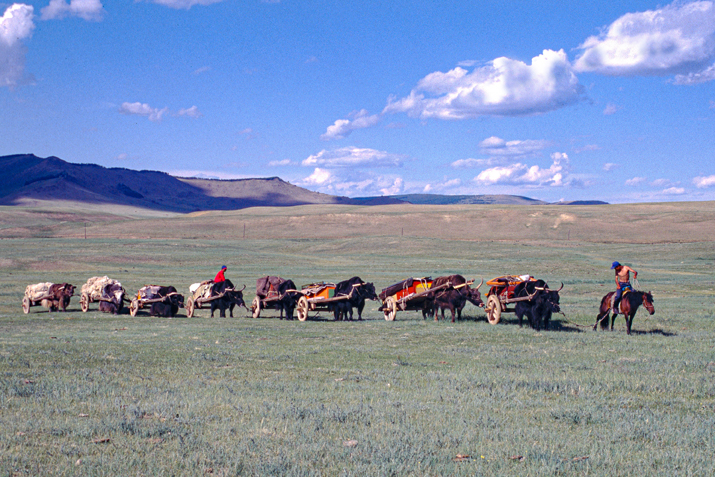
Doubters have little chance of survival in the wilderness
N 49°20'680'' E 101°10'831''
Day: 56
Sunrise:
06:55
Sunset:
19:24
As the crow flies:
15,46
Daily kilometers:
20
Total kilometers:
709
Soil condition:
Meadow
Temperature – Day (maximum):
26°C
Temperature – day (minimum):
22°C
Temperature – Night:
minus 5°
Latitude:
49°20’680”
Longitude:
101°10’831”
Maximum height:
1170 m above sea level
Time of departure:
12:30
Arrival time:
18:30
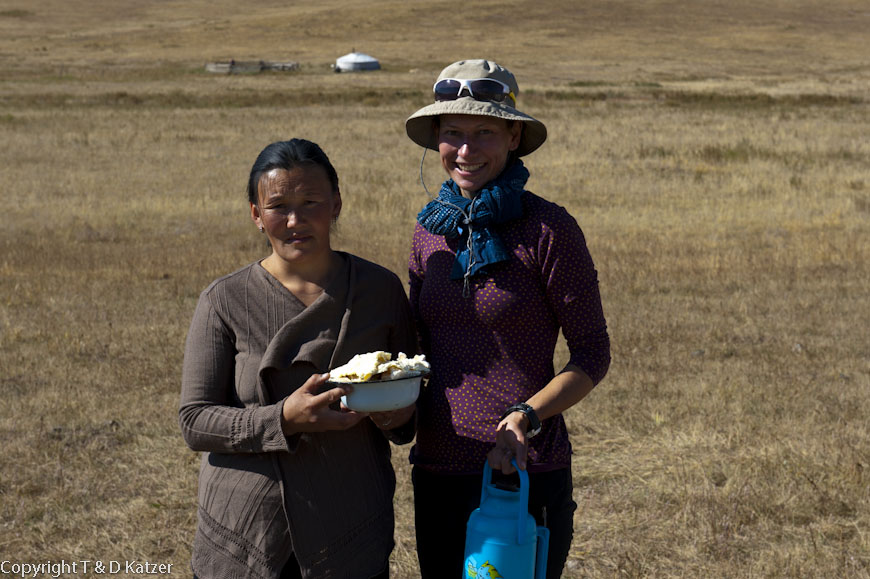
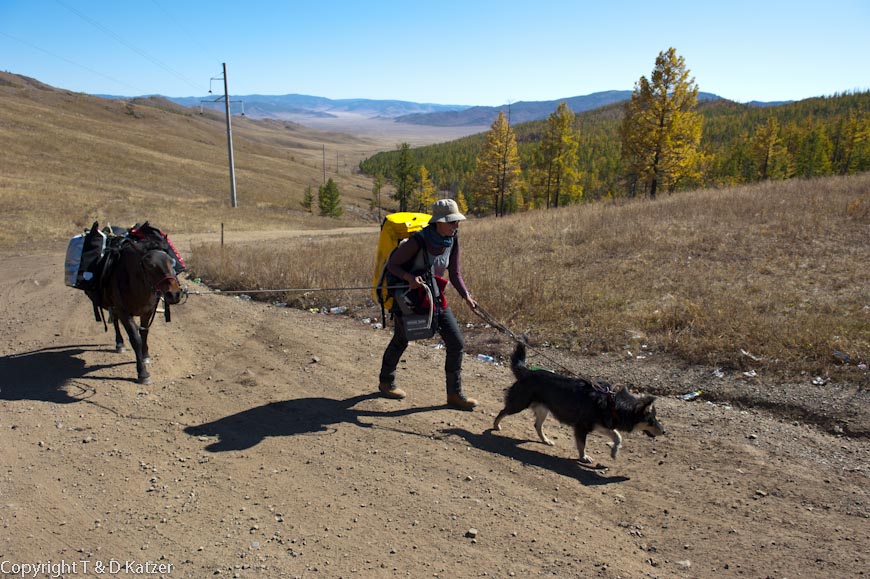
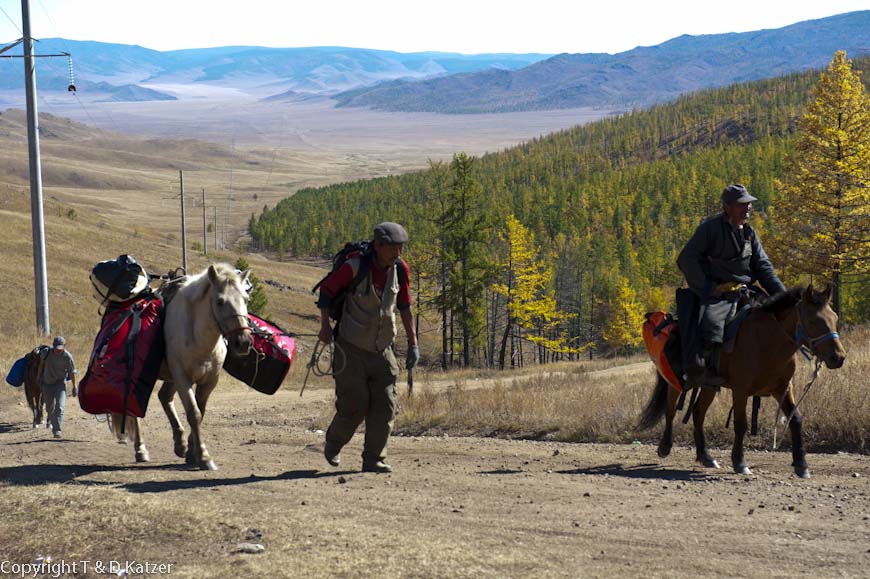

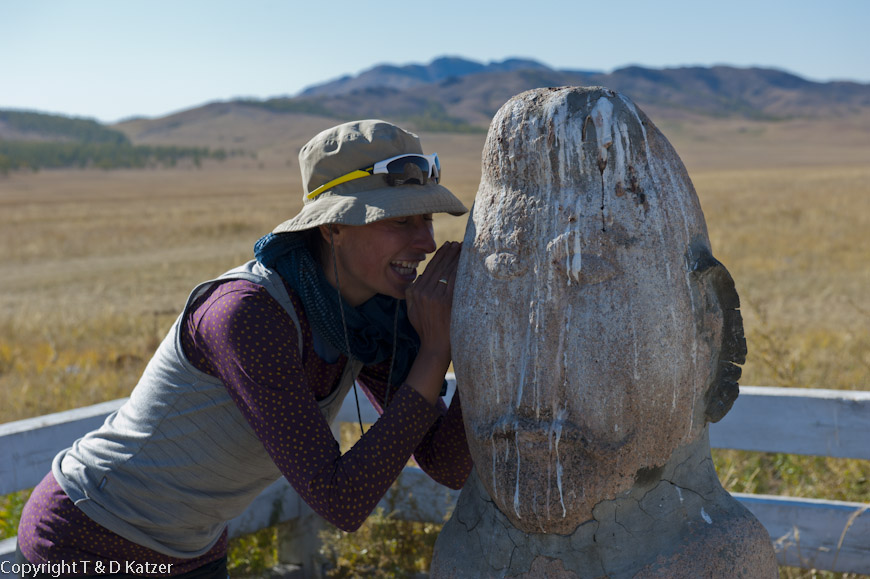
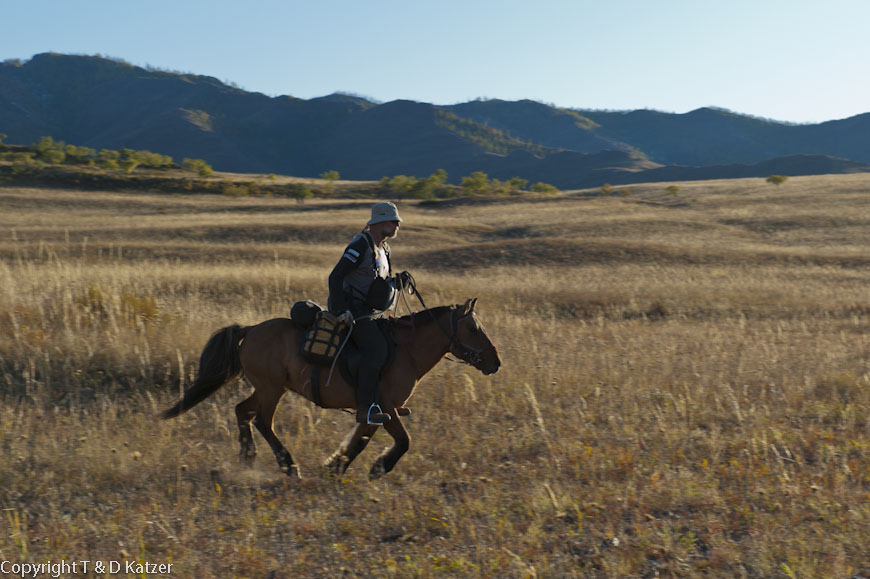
Just recently we were talking about how we had received milk, cheese and tea from the locals on our earlier Mongolia expedition. It was no exception that women brought us these gifts with a laugh. Not that we are waiting to receive these products. I don’t tolerate them well anyway because of the fat content. It is simply an observation. “The nomads have probably adapted to the western world through electricity generation and the resulting television. Today we are no longer as special as we used to be. Maybe that’s why we’re ignored more than we used to be?” I ponder as a woman appears at our camp and brings us fresh milk, arul (dried cheese), orum (cream) and salted milk tea. “I can’t believe it,” I swallow my hastily uttered words about adapting to the Western world.
We postpone our departure again and sit down for a second breakfast with the friendly woman from a nearby yurt. “Finally a woman in the camp,” says Tanja happily, as she is mostly surrounded by men on this trip. We set off at 12:30 pm. After just a few minutes, the path becomes so steep that Bor refuses to work and starts puffing wildly. This time we don’t manage to pull the wagon up with our combined horsepower. We get out of the saddle and think about how to get our loads up the high pass. “We have to unload the horse-drawn cart,” says Bilgee. “Okay, then we’ll unload it,” I reply. Tanja, Ulzii and I unload everything except for the aluminum boxes. In the meantime, Bilgee explores the path to the top of the pass. When he returns, this time he ties three towing ropes to the drawbars. While Tanja films the first few meters again and then takes care of the equipment, this time the three of us pull the car up. Bor also does his best. “Chooo! Choo-choo! Tschuuuu!”, we drive our horses to keep the pulling ropes taut. It’s a real drudgery to constantly drive Sar, keep the rope taut and make sure that Bilgee and Ulzii are pulling the wagon up on one level. None of us doubts for a second that we won’t make it. That would be fatal. Should Bor suddenly stop and the wagon pull him backwards, he, the wagon and the load would be lost. Strength alone is not enough for this heavy work. Our conviction to bring the horse-drawn carriage to the top with united will plays an essential role. Doubters have little chance of survival here in the wilderness. A realization that soon becomes apparent to me on a daily basis.
Exhausted but in good spirits and in high spirits, we reach the Ovol at the top of the pass without the slightest incident. “You take care of the horse-drawn cart and we’ll ride to Tanja’s and bring the rest of the equipment up with the horses,” Bilgee suggests. “Okay,” I reply, although I would also like to help bring up the equipment. I’m lying in the grass watching the eagles circling above me when I hear Tanja calling. Startled, I drive up and sprint down the pass road. She carries the heavily laden Naraa behind her, shouldering two camera bags and carrying a large waterproof bag on her back. “Look, I loaded it all myself,” she calls out to me, laughing and proud. Once again, a lone rider has arrived at the right time. He also helps to bring some of the equipment to the top. When everyone is at the Ovol, I take over the loading of the horse-drawn cart. Then it goes down again on the other side of the ridge. But this time much steeper than yesterday. Bilgee builds his special brake from his scarf and logs from the forest. We join forces to brake the car into the next high valley. The rider leads four of our horses down and thus also does a great service. In the shade of the tall trees, we recharge our batteries for the route ahead. “I feel like you’re all my children,” Bilgee laughs, obviously having taken us to his heart. We say goodbye to the foreign rider and thank him warmly. “Zugeer, zugeer!” (no probelem, no problem), he shouts as he rides off.
In the next dream valley of the highland steppe, we come across a 2,000-year-old cairn. Bilgee and Ulzii stand next to the statue of a long-gone civilization and whisper their wishes in its ear. “If you do that, they come true,” says Ulzii, whereupon we also breathe our heart’s desires, wishes and dreams into this elderly man’s ear. Then we do as our men do and take some earth from the foot of the cairn to sprinkle over our horse’s head or back. This custom is also intended to protect the horse and its rider. We take the opportunity of this unusual break to fortify ourselves with hot tea and cookies. The thermometer is also 39 degrees in the sun today. Because we didn’t trust the weather, Tanja and I are sweating in our long winter underpants. To be honest, I feel like I’m at the center of an oversized headlock.
At 6:30 p.m., we head through a wide, very dry-looking valley. It reminds me of when we crossed 1,500 kilometers through Pakistan with our camels in 1995. The Marri Mountains, a foothill of the Himalayas, have similarities with this landscape. “Baihgui Us”, (no water) I say to Bilgee, who scans the landscape with his binoculars. “Baihgui Us,” he confirms. “How much further is it to the Selenge River?” I want to know. “Maybe five or seven kilometers.” “We should set up camp anyway. Otherwise it will be too late. We’re all very tired after the day’s exertions,” I say. Bilgee nods her head in confirmation.
When unloading the horse-drawn carriage, Tanja realizes that we have lost almost all our muesli bars, a knife and a few packets of jelly babies. “The little bag must have fallen out of the car when crossing the pass. What a pity. I wish we had eaten it before. Maybe the lonely rider who helped us at the pass found it. He looked very poor in his torn clothes. I wish he had these treasures,” says Tanja, a little sad about the loss.
After a quick meal, we all hurry off to our tents. Tanja and I lie exhausted on our camping mats and listen to our horses graze. It is a pleasant, familiar sound that has accompanied us since the beginning of this journey.
We look forward to your comments!

